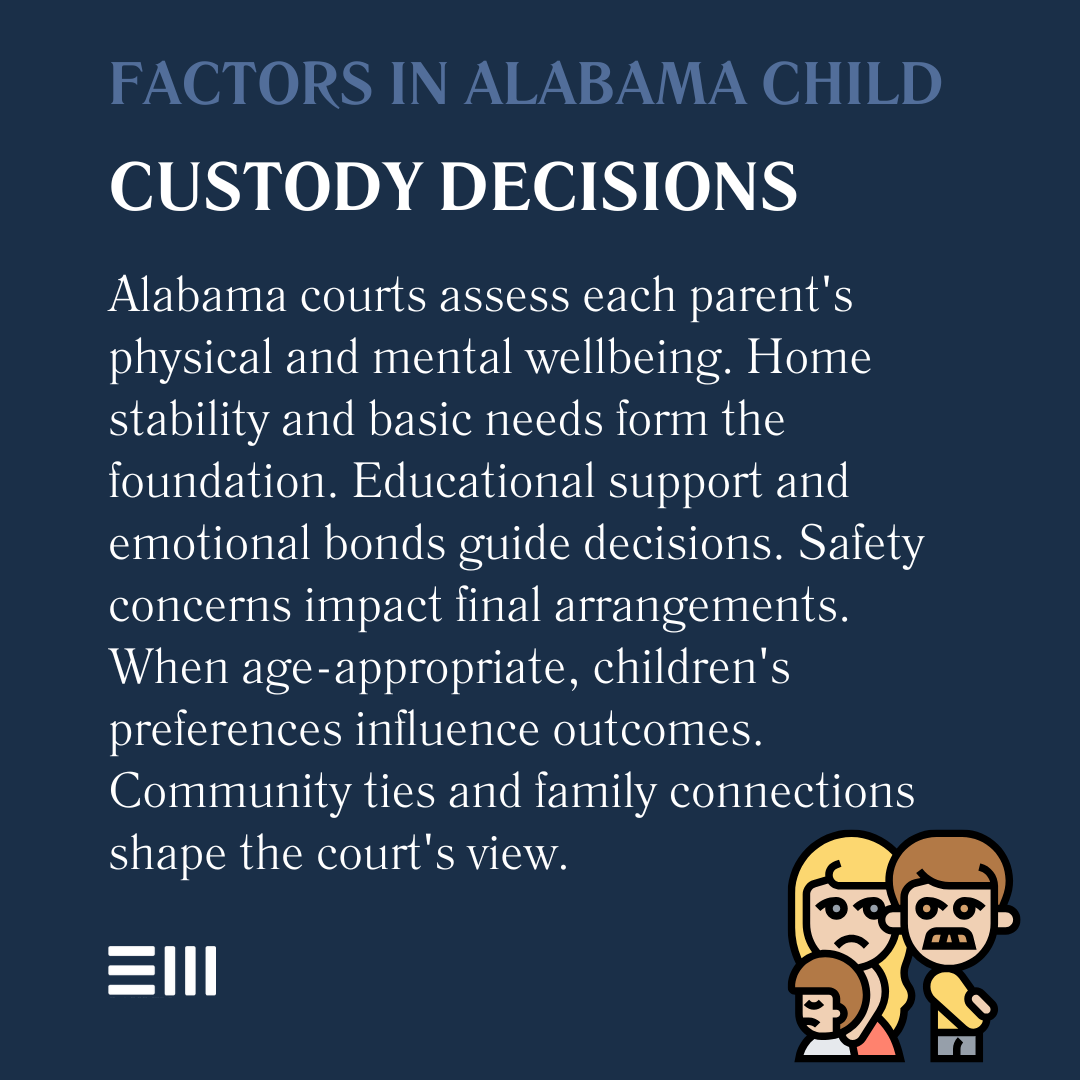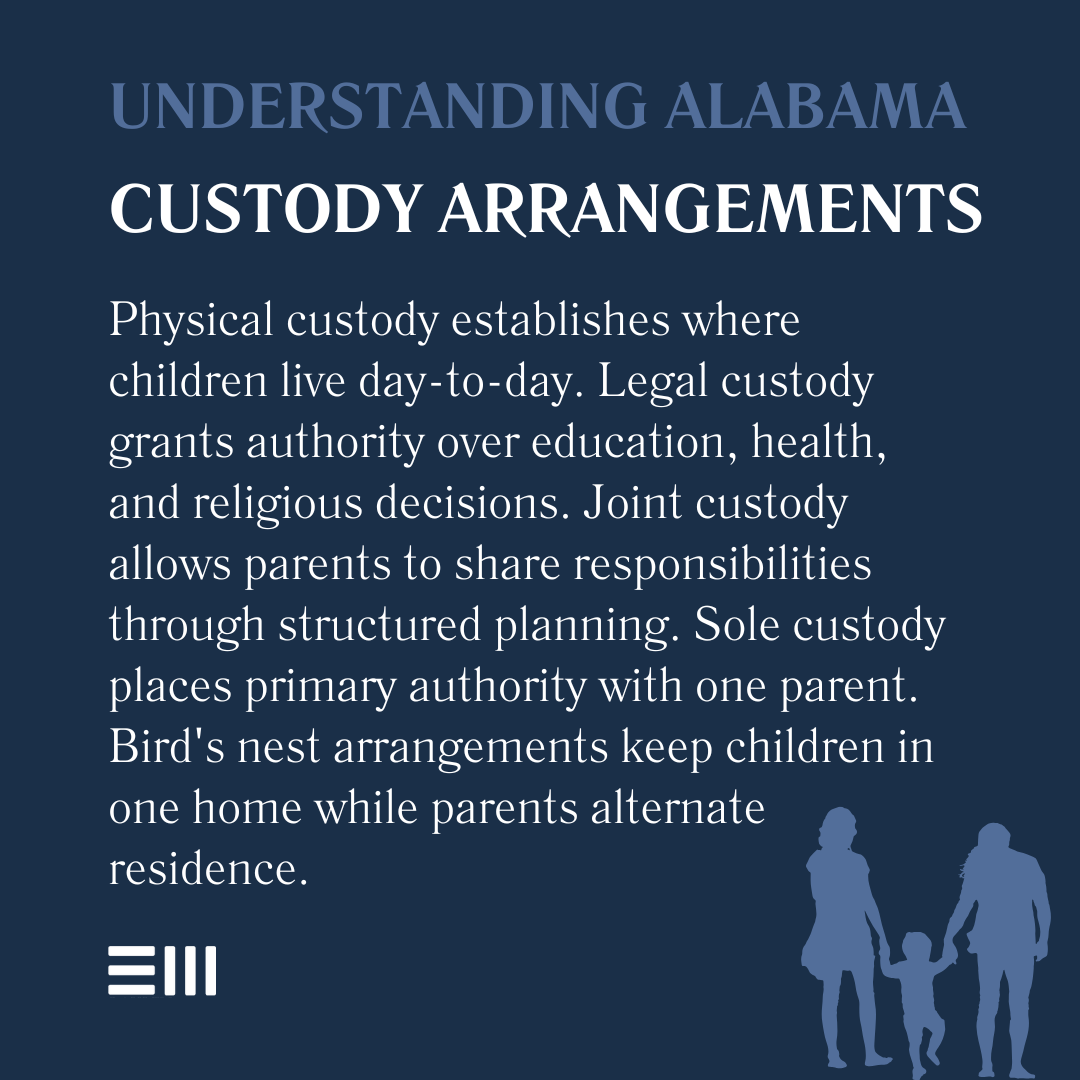Behind every custody decision stands a family in transition, each hoping to build the strongest possible future for their children.
While courtrooms may seem austere, they serve as the backdrop for some of life's most profound moments—where judges thoughtfully weigh each unique family situation, and parents advocate for continued meaningful relationships with their children.
These decisions shape daily routines, holiday celebrations, and countless precious moments in between.
Best Interests of the Child in Alabama
Before examining specific custody factors, it's important to understand that Alabama courts base all decisions on the child's best interests, considering their physical, emotional, and developmental needs.
Key factors the courts evaluate include:
- The child's age, health, and emotional ties with each parent;
- Each parent's physical and mental health;
- The stability of each parent's home environment;
- Each parent's ability to provide basic necessities;
- The child's educational needs and community connections;
- Any history of domestic violence or substance abuse;
- The child's preference (if age-appropriate);
- The level of cooperation between parents;
- Each parent's willingness to support the child's relationship with the other parent;
- The geographic proximity of parents' homes;
- The child's relationship with siblings and extended family;
- Each parent's work schedule and availability; and
- The child's cultural and religious needs.
These factors work together to help judges create custody arrangements that support children's well-being and development.
Courts carefully weigh each element's impact on the child's daily life and long-term growth.
Types of Custody Arrangements in Alabama
Understanding the different types of custody arrangements helps parents better prepare for their custody proceedings and set realistic expectations.
Alabama courts have evolved to recognize various arrangements that can accommodate modern family dynamics.
Alabama courts recognize these primary custody arrangements:
- Physical Custody: Determines where the child lives and includes primary physical custody (child lives mainly with one parent) or shared physical custody (substantial time with both parents);
- Legal Custody: Controls decision-making rights about education, healthcare, and religion, with options for joint or sole authority;
- Joint Custody: Shared responsibilities between parents, requiring detailed parenting plans and strong communication;
- Sole Custody: Primary authority granted to one parent, typically reserved for cases involving abuse, neglect, or parental incapacity;
- Bird's Nest Custody: Children remain in the family home while parents alternate residence, minimizing disruption to children's routines; and
- Split Custody: Different arrangements for different siblings, though courts generally prefer keeping siblings together.
Each arrangement can be customized to meet your family's unique circumstances and needs. Courts often approve creative solutions that serve children's best interests while accommodating parents' work schedules and living situations.
The Alabama Custody Determination Process
The path to a custody determination involves several key steps that parents should understand to navigate the process effectively.
Each phase requires careful preparation and attention to detail to achieve the best possible outcome.
Standard proceedings include:
- Filing the initial custody petition with required documentation;
- Mandatory parenting classes covering co-parenting strategies and child development;
- Mediation sessions to resolve disputes and develop parenting plans;
- Temporary orders hearing to establish interim arrangements;
- Discovery phase involving document exchanges and depositions;
- Guardian ad litem appointment to represent children's interests;
- Custody evaluation by mental health professionals;
- Final hearing presentation of evidence and testimony;
- Post-judgment compliance monitoring; and
- Periodic reviews as needed.
Following this process helps ensure thorough consideration of all relevant factors in your case.
Modifying Existing Custody Orders
Life changes often necessitate custody modifications. Alabama courts require substantial changes in circumstances to alter existing arrangements.
Understanding what constitutes a material change helps parents prepare stronger modification requests.
Valid reasons for modification include:
- Relocation of either parent beyond 60 miles;
- Changes in work schedules affecting parenting time;
- Medical emergencies or chronic health conditions;
- Safety concerns supported by evidence;
- Significant changes in the child's needs or activities;
- Evidence of domestic violence or substance abuse;
- Remarriage affecting family dynamics;
- Children's evolving needs as they age;
- Educational opportunities requiring schedule adjustments; and
- Military deployment or return from service.
Each modification request must demonstrate how the proposed changes serve the child's best interests.
Courts typically require clear evidence that benefits outweigh potential disruption to established routines.
Frequently Asked Questions About Alabama Child Custody
Parents often have specific questions about custody proceedings.
Here are answers to common concerns that arise during the process.
How Does Joint Custody Work in Alabama?
Joint custody arrangements typically involve shared decision-making responsibilities and can include various physical custody schedules.
Parents must demonstrate the ability to cooperate and communicate effectively. Successful joint custody requires detailed parenting plans addressing holidays, education, healthcare, and daily routines.
What Rights Do Grandparents Have in Custody Cases?
Alabama recognizes grandparent visitation rights under specific circumstances, particularly when maintaining the relationship serves the child's best interests.
Courts consider pre-existing relationships, family dynamics, and the parents' positions on grandparent involvement.
Can My Child Choose Which Parent to Live With?
While Alabama courts consider a child's preference, age and maturity level determine how much weight this preference carries in the final decision.
Generally, older teenagers' preferences receive more consideration, but they're never the sole determining factor.
How Does Relocation Impact Custody?
Parents must provide proper notice and obtain court approval before relocating with the child. The court evaluates how the move affects the child's relationship with both parents, educational opportunities, and social connections.
What Evidence Should I Gather for My Custody Case?
Document your involvement in your child's life through school records, medical appointments, extracurricular activities, and daily care routines.
Keep detailed records of communication with the other parent, financial contributions, and participation in school events.
Take the Next Step in Your Custody Journey
Every child deserves a stable, nurturing environment that supports their growth and development.
Our experienced family law team stands ready to help you navigate Alabama's custody process and create arrangements that truly serve your child's best interests.
With decades of combined experience in family law, we understand the complexities of custody cases and the importance of achieving positive outcomes for families.
Contact us today to schedule a confidential consultation and discover how we can help protect your rights and your child's future.


